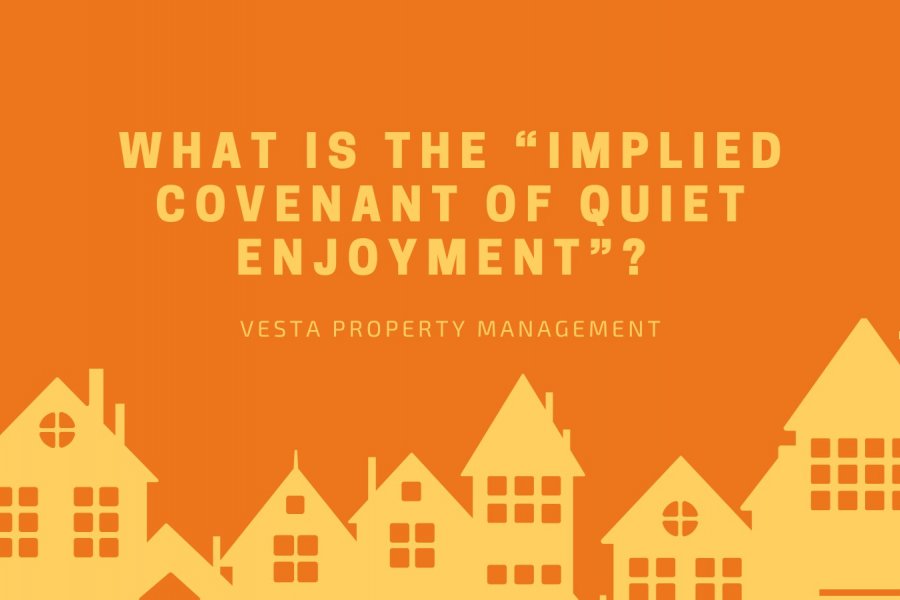
- Respect Tenant Rights Always: The implied covenant of quiet enjoyment means tenants have the right to peaceful use of their rental without unnecessary disruptions.
- Address Issues Promptly: Respond quickly to maintenance, noise complaints, and any disturbances to prevent legal problems and keep tenants happy.
- Communicate Clearly: Give proper notice before entering the property and keep tenants informed about inspections or renovations to build trust.
At Vesta Property Management, we know that for rental property owners, understanding the legal responsibilities involved in leasing is essential to maintaining strong tenant relationships and minimizing disputes. One important but often overlooked legal concept is the “implied covenant of quiet enjoyment.”
While this term may sound abstract, it plays a critical role in every landlord-tenant relationship. Landlords who do not honor this covenant risk legal claims and higher tenant turnover.
Discover the Benefits of Hiring Vesta Property Management!
"Implied Covenant of Quiet Enjoyment" Defined
The implied covenant of quiet enjoyment is a legal promise that tenants can use and enjoy their rental without significant interference. It is automatically part of every lease, even if not written. This right covers more than noise and guarantees peaceful and undisturbed use of the property.
Landlords or anyone acting for them must not disrupt tenants and should address interference from third parties when possible. For example, ignoring a noisy or trespassing neighbor could violate this covenant.
Legal Roots and Application
The implied covenant of quiet enjoyment originates from common law and is recognized in most states in the U.S. as a fundamental tenant’s right. Because it is implied by law, landlords are held to this standard regardless of whether it appears in the written lease agreement.
It typically covers a wide range of potential disruptions, including:
- Repeated and unauthorized landlord entry into the unit.
- Ongoing major construction work that severely interferes with living conditions.
- Failure to address disruptive neighbors or criminal activity on the premises.
- Neglecting essential maintenance renders parts of the home unusable.
- Harassment or intimidation by the landlord or their agents.
Each state may interpret and enforce this covenant differently, but the basic principle remains: tenants have the right to use their rental without unjustified disturbances.

Common Violations of Quiet Enjoyment
Many landlords may unintentionally violate this covenant simply by misunderstanding the scope of their responsibilities. Some common examples of violations include:
-
Unreasonable Entry: While landlords may need to enter the property for inspections, maintenance, or showings, they must provide reasonable notice and enter only during appropriate hours unless there's an emergency. Constant, unannounced visits can be considered harassment and a breach of the covenant.
-
Ignoring Maintenance Needs: Tenants are entitled to a livable home. If plumbing issues, pest infestations, broken HVAC systems, or water leaks go unresolved for long periods, this could impair the tenant’s use of the property, violating their right to quiet enjoyment.
-
Failure to Address Noise or Nuisance Complaints: If tenants report loud, disruptive neighbors, ongoing parties, or illegal activity nearby, landlords must act within reason. Turning a blind eye to such disturbances could be grounds for legal claims.
-
Disruptive Renovations: While property upgrades are part of managing a rental business, significant renovations that impact the tenant’s ability to live normally, especially without proper notice or temporary accommodations, may amount to a violation.
Understanding these examples helps landlords prevent issues before they escalate into legal disputes or lost rental income.
Learn How We Help Real Estate Investors Succeed!
Tenant Rights and Legal Remedies
When a landlord violates the covenant of quiet enjoyment, tenants have several possible legal remedies. These vary by jurisdiction but generally include:
- Withholding rent until the issue is resolved (where allowed by law).
- Terminating the lease early without penalty.
- Suing the landlord for damages caused by the interference.
- Reporting violations to local housing authorities.

Landlords who repeatedly fail to uphold this covenant may face financial penalties, legal expenses, and damage to their reputation in the rental market. That’s why it’s essential to approach every tenant complaint or concern with seriousness and a commitment to resolution.
Best Practices for Landlords
Maintaining a positive rental experience starts with respecting tenant rights. Here are some practical ways to uphold the covenant of quiet enjoyment:
-
Maintain Clear Communication: Notify tenants in writing before entering the property, and always give at least 24 hours’ notice when required. Explain why you’re entering and for how long.
-
Address Maintenance Promptly: Implement a system for tenants to report maintenance issues and set timelines for responding and resolving them. A proactive approach prevents minor problems from becoming major disruptions.
-
Handle Complaints with Care: Take tenant complaints about noise, neighbors, or disruptions seriously. Document complaints and any actions taken in response. Follow through and involve local authorities if needed.
-
Be Mindful During Renovations: Plan property upgrades around tenant schedules when possible and minimize disruption. Offer alternatives, such as temporary rent discounts or housing, if work will be especially invasive.
By prioritizing your tenants’ comfort and peace, you not only avoid legal trouble, you also foster long-term loyalty and more consistent rental income.
Working with a Property Management Company
Many rental property owners find it challenging to balance daily operations, tenant relations, and legal compliance, especially if they’re managing multiple units or working full time elsewhere. That’s where a professional property management company can be invaluable.

Property management companies are experienced in handling tenant communication, enforcing lease terms, and maintaining properties in a way that aligns with all applicable laws, including the covenant of quiet enjoyment. They understand how to:
- Document all interactions to protect yourself from legal disputes.
- Respond quickly to maintenance and noise complaints.
- Conduct legal and respectful inspections and property visits.
- Ensure tenants feel heard, respected, and secure in their homes.
By partnering with a management company, you can delegate the responsibilities that impact tenant satisfaction while maintaining oversight of your investment. This level of support minimizes risk and helps create a seamless, professional rental experience.
Discover Our Property Management Services!
Bottom Line
The implied covenant of quiet enjoyment is a promise that forms the foundation of trust between landlords and tenants. As a rental property owner, honoring this covenant not only keeps you compliant with the law but also promotes tenant satisfaction, reduces turnover, and strengthens your reputation.
If managing those responsibilities becomes too overwhelming, partnering with a qualified property management company ensures that this covenant is upheld at all times. Reach out to Vesta Property Management if you need assistance.